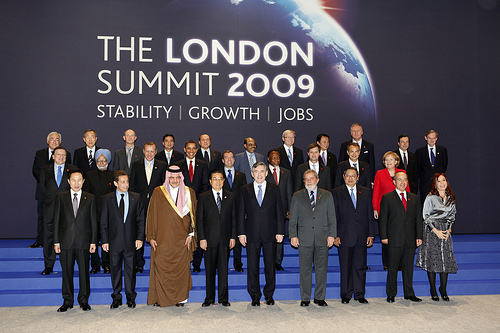
This post on the G-20 was originally published on the New American Contract blog, Value Added:
After watching Gordon Brown on the live webcast of the London G-20 Summit, it appears that leaders have made some serious headway on one of the two major criteria laid out by Martin Wolf at the New America Foundation last week – a significant increase in resources to help developing countries.
Specific measures they agreed on total $1 trillion and include: tripling the IMF’s usable resources, selling $50 billion in IMF gold (the proceeds of which will go to developing countries), and issuing $250 billion in SDR. The proposal for SDR issuance was strongly supported by speakers at New America Foundation last week including in this interview with Martin Wolf and in this speech by George Soros.
On the second major issue facing the G-20 – boosting fiscal stimulus in surplus countries – the G-20 has failed to reach consensus. Knowing that this would be an area of interest at the press conference, Gordon Brown was armed with the statistic that $5 trillion new dollars have been set aside by countries around the world.
Brown’s estimate of the fiscal stimulus is a gross exaggeration. The only way he could have reached that figure is if he included international measures to stabilize the financial system.
If one looks exclusively at the fiscal expansion, as this IMF paper does, stimulus in the nine largest economies (who have born the brunt of the stimulus efforts) have averaged .5%, 1.6% and 1.3% of GDP in 2008, 2009 and 2010 respectively. If every economy was stimulating at the same rate as China, US, Germany, and France (which they aren’t) the global stimulus would only equal $2.1 trillion for the years 2008-2010. Even this $2.1 trillion figure is an exaggeration. Smaller economies are stimulating far less, even as a percent of GDP, than the major economies of the world.
My largest concern with the G-20 meetings was born out. Merkel and others who resisted stimulus largely for domestic political reasons, did not allow President Obama to set the agenda for the summit. As a result, deficit countries will lead stimulus efforts and continue to spend and borrow, and surplus countries will inadequately stimulate their economies and continue to save and accumulate reserves. For those who believe that macroeconomic imbalances were a principal cause of the crisis, the failure for this G-20 to get surplus countries to stimulate is a serious concern.
— Sam Sherraden


9 comments on “G-20 Assessment: Good For the Developing World, Stimulus Not Addressed”